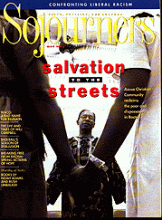Running for president and working for social justice are often irreconcilable activities. A commitment to social justice demands a prophetic perspective. And prophets, as the Bible tells us, are rarely welcome in their own country. They aim for truth, no matter how uncomfortable or disturbing. Politicians, at their best, attempt to balance many competing demands, concerned both for truth and electoral success.
In his exceptional book The Democrats' Dilemma, Steven Gillon begins by recounting the prophetic roots of Walter Mondale's life. Mondale "inherited" his values from his father, a Methodist preacher, and his mother, an active layperson. He was schooled in the Methodist social gospel, from which he gained a "deep compassion for the underprivileged and a strong populist disdain for wealth and power."
At the home of Theodore and Claribel Mondale, strangers were always welcome. "The Mondales welcomed into their home anyone who was temporarily homeless, passing through town, or had fallen on hard times."
The fruits of those values are evident in Mondale's political career. Upon his nomination to the vice presidency, The Wall Street Journal reported that Mondale's reputation as a populist had caused a downturn in the stock market. When told of the news, Mondale smiled and said, "My father would have been proud of me."
Gillon gives us other glimpses of this prophetic streak in Mondale. Early on, Mondale thought the fight for racial justice was the most important problem facing the nation. As a senator, he was one of the strongest supporters of civil rights. His boldest initiative was to sponsor the most controversial part of the Johnson administration's civil rights bill: fair housing. In the aftermath of the 1967 riots, with white middle-class resentment rising, virtually everyone told Mondale to give up that lost cause. Mondale disagreed ... and won.
Read the Full Article

